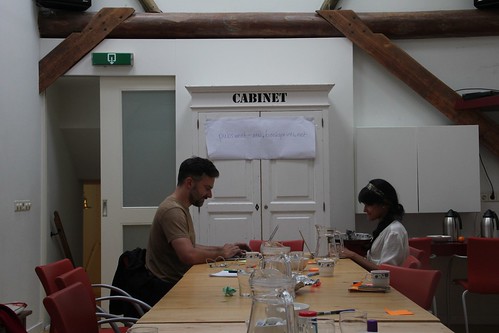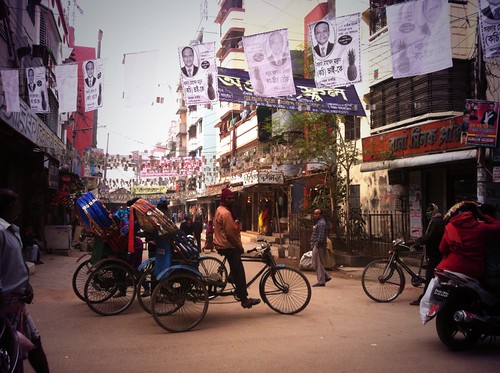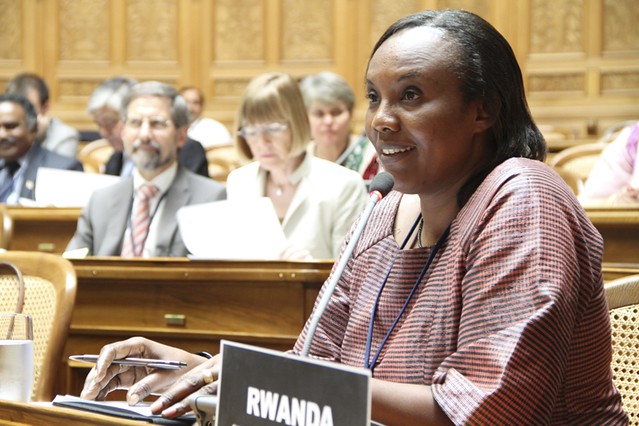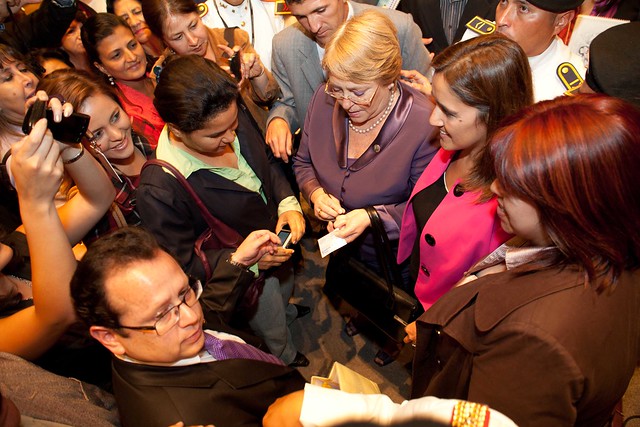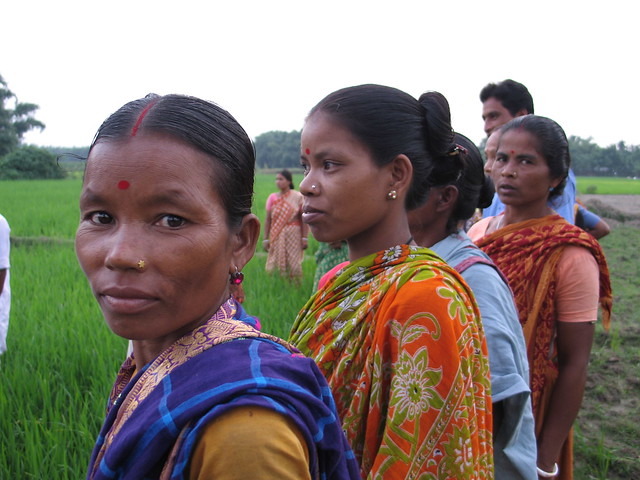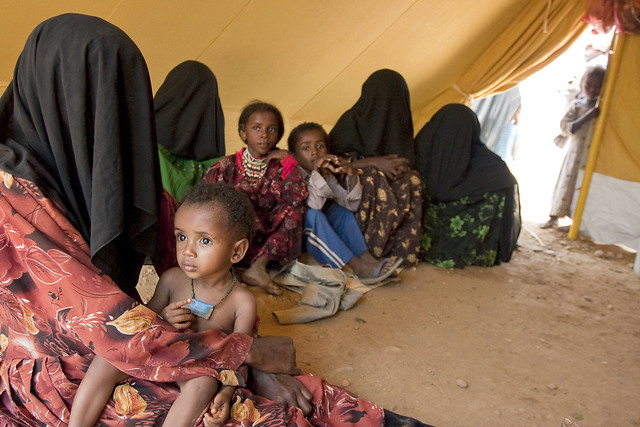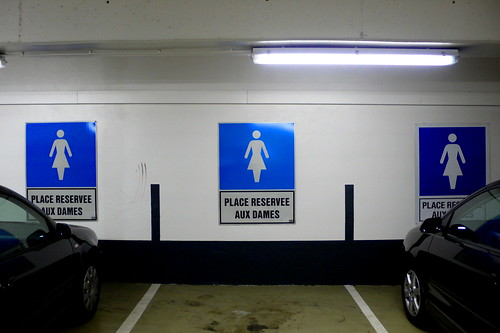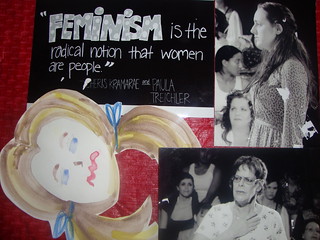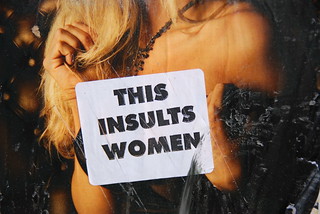One of my first consultancy projects is looking at strengthening the open source ecosystem, and as part of it, I’ve been catching up on research that might help inform next steps - such as Nadia Eghbal’s 2020 book, ‘Working in Public: The Making and Maintenance of Open Source Software’.
Category: Diversity
I can remember quite distinctly the first time I realised people think about the world in very different ways. For me, it all began with music.
I went to see Hidden Figures last week after being excited about it for a long time. There are a lot of reasons I loved it. Loooooved it. Go and see it. But it also made me think about the harder-to-tell parts of that story - insecurity, uncertainty and flaws.
A few months ago I was talking to a (white, male) friend about the current political situation in Bangladesh. I was explaining how there had been crackdowns on freedom of expression, and that I knew of people who weren’t being as forthright with their opinions as they would otherwise be.
He said: “Wow- self-censorship. That’s terrible, that’s the first sign of an authoritarian state.”
I agreed. It is a bad sign - but what I didn’t say then, is that in reality I know of lots of people working in the sector I do, who regularly self-censor. People of colour, and women. Not for fear of a government or a politically restrictive state, but for fear of their future career development. The irony doesn’t escape me - we’re all for freedom of information, equality, social justice - but here we are.
I’ve just started my fellowship at Data & Society, and I wanted to write about the feelings I had a few months ago when I found out about it. Long story short, I got the strongest case of ‘imposter syndrome’ I’ve ever had. As I’ve learned from smart friends, vulnerability is strength, so I tried to be open about how I was feeling.
Morning clouds of disbelief have given way to sadness. I’m grieving, as are at least 16 million other people around me. Not only for the EU and for a united stance against the horrors of the world today - but for the country I grew up in.
3 months ago, I started writing a newsletter for the engine room, on the topic of Responsible Data. As a result, I’ve been thinking a lot about the potential role of newsletters in online communities, and trying to work out what value this particular newsletter could bring.
This NYMag piece on newsletters as online ‘safe spaces’ made me think a lot about what that means for community building. Sadly, nowadays, ‘open’ social media platforms which are used to provide channels of communication and discussion can be dangerous places for feminist activists, women or other marginalised communities, or simply people talking about topics like social justice or social change. Despite this, lots of online community gathering still happens on social media platforms - tweeting with a certain hashtag, participating in online discussion forums, or joining a specific Facebook group, for example. What other options are there for bringing together a community, without venturing into increasingly uncomfortable social media spaces?
Over the past year or so, I’ve been trying out a couple of informal event styles to bring people together around a certain topic, and enable a deeper style of discussion than often happens at bigger conferences.
Warning: really long post. For a reading list of books, blogs and more which take a critical perspective on tech/data and are written by women, scroll to the bottom, or check out this Twitter list of the women mentioned below!
If we think long enough through the ‘theories of change’ of many of the organisations and movements I find myself around, we should eventually come to the step of making ourselves redundant. In my previous role with School of Data, we were very clear about this: we even had a workshop session once where we were tasked with drawing up our own project ‘obituary’.
The idea of playing a certain role for a certain time - that is, until others can do it better, and where at some point, that particular role will be unnecessary - appeals greatly to me. It means my job will keep changing, and I’ll have to keep learning new things. It means I’ll have to, by necessity, be flexible, and not become too attached to a function or a role. It also means that other people will step up and at some point, I’ll have to recognise that it’s time for me to step away.
Tomorrow is International Women’s Day; in my mind, a day for celebrating, and thanking, inspiring women. When I think of the most inspiring women I know personally, and the most important conversations I’ve had with them, almost all of them have one slightly counterintuitive thread running through them: vulnerability and weakness.
Last week, my friend Tin wrote about being intentional about who was in his networks. His thoughts got me thinking about not only who is in my own network, but also what, and how to widen both.
In lots of ways, this is actually the opposite of what many social networks and platforms are trying to do, and this worries me greatly. “You might also like…”, or “Recommended for you” features point us towards things that we’ll like because they are similar to us, rather than things that will make us think.
Part two of a few of my favourite things from 2014, (see here for Part 1); this time Feminism, Diversity + Inclusivity, Bangladesh, and All-women lists.
Earlier this weekend, I came across this reddit post, entitled ‘Being a black woman in Berlin’. It’s a sad endictment on society here in Berlin that someone is experiencing such awful treatment from those in the city; sadly, though, I’m not surprised, judging from my own experiences. I’m also finding both the original post and the following comments to be revealing about German society in general.
In the original post, an African-American woman describes her experiences of moving to Berlin, and facing constant harassment and racism here in Berlin, specifically while living in Moabit. While obviously I can’t comment on the experience of black women in Berlin, I can from my own perspective as a British-Asian woman living here, and there were a few key things that she wrote that I can strongly sympathise with.
Last week, I took part in a 'booksprint', which involved bringing together a group of people from different disciplines, to collaboratively write a book from start to finish in just three days.
It was my second booksprint - the first being this, "How to Read and Understand an Oil Contract", which I coordinated logistics for, and participated in as target reader - but my first as a fully-fledged writer. It was a brilliant experience, for a number of reasons - some obvious, some less so.

Yesterday, I went to a fantastic wedding. It was truly wonderful for a number of personal reasons, given that it was my brother's wedding (!) – but it was also, for me, a great example of how an old-fashioned institution like marriage can be brought into the 21st century, and celebrated without gender-bias.
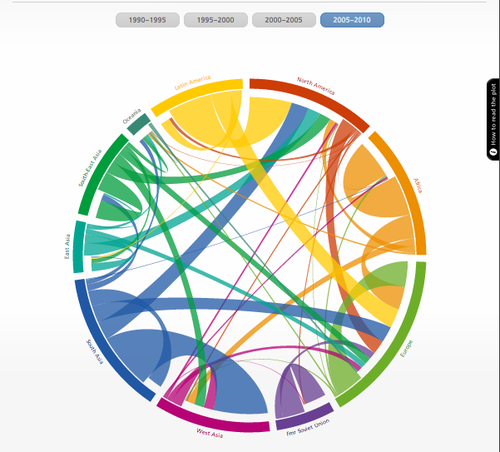
[Image credit: an amazing visualisation on migration flows, on http://global-migration.info]
In a couple of weeks, my brother is getting married. This is a hugely exciting event in my family, and family members are coming from all around the world to attend the wedding(s) – they're having the actual wedding in Devon, and then a 'reception' up where my parents live, in Manchester.
Party details aside, I don't think I'll have ever seen so many of my family members gathering in one place before; though we still have lots of family in Bangladesh, we've all travelled a lot. It's made me think a lot about the various cultures that are encompassed within our extended family – within just a couple of generations, we've put roots down all across the world, and that has brought with it some interesting changes in cultural values among us.
A few weeks ago, someone asked me at a party, “Where do you come from?” and then second-guessed my answer, asking “No no, I mean where do you come from, originally?” This isn't anything new, sadly, but what happened afterwards surprised me.
Someone I didn't know very well interrupted my interrogator, with
“You know, that question is racist.”
I was speechless. A white German man, who I'd never really spoken to, was saying almost exactly what I was about to say. The conversation continued, with protests from the man asking the questions, and the man who interrupted him explaining clearly and firmly why asking different questions to different people based on their skin colour, as well as not accepting their answer, is racist.
It was wonderful.
Having those conversations, explaining to someone why what they're saying or doing is discriminatory, is incredibly tiring. Sometimes I don't even bother; I just answer the question, then walk away, but I always feel a twinge of almost guilt, knowing that they'll likely just go ahead and continue their behaviour as is.
But then again, it's not my responsibility to explain the world and its migration flows to them... so whose is it? When someone else – and especially, someone who has likely never been asked that question in his entire life in Germany – decided to step in and help explain, it was incredibly welcome and (sadly) a huge surprise.
It's all very well not engaging in discriminatory practices yourself, or having an increased self-awareness of what you and those around you are doing; but going that step further, and actually speaking out, is much more than many people actually bother doing. Naturally, it's part of the privilege bestowed upon sections of society that we/they can actually ignore discrimination to the level of never having to engage with it; that, however, is not making it go away for the rest of society.
Perhaps there's the worry of 'mansplaining' or speaking over others, but (and obviously, I can only speak for myself here) – knowing that there are active allies who I can turn to in those cases is really so reassuring. People who would not just stand by me while I get into an argument with someone over what is considered racist or not, but those who would actually join the argument rather than watching from the sidelines.
If you're really, truly, wanting to use your position of privilege, wherever it may lie, then stop being a passive observer of discrimination around you, and actually do something about it. Say something. Explain why. If it's purely a case of ignorance on their part, then it's your responsibility to educate them just as much as it is anyone else's.
PS. There are ways of doing this that are considerate and understanding, but also get the point across – Willow's blog on this topic addresses some of these points really well.
“That guy just said something really racist* to me.”
“Really? ...but he seems so nice!”
[*Throughout this post, you can replace the word “racist” with basically any type of prejudice or discriminatory behaviour, and everything will still be relevant.]
I've had this conversation more times than I can count, upon telling someone I'm with about the behaviour of someone else around us.
Every time I hear this response, I'm filled with utter disbelief. Do people think that racist idiots somehow look or act different to the rest of us, most of the time? That they have green horns sprouting from their heads, or walk around with a sign on their head advertising their particular form of bigotry? Or that they begin all conversations by explicitly stating their prejudices?
Let me save you some time; they don't.
In fact, most of the time these people function as a regular, perfectly pleasant human beings in society. And, if you don't happen to fall into a group against whom they discriminate, it's highly likely that you might never have witnessed their ugly behaviour. It makes sense, doesn't it? For them, you may well be exactly the right skin colour to fit within their bigoted views – so, clearly, you'll be seeing their very best side ( in effect, the person that they could be to everyone, were it not for those prejudices – isn't that sad?).
To state the very, very obvious: you are likely never going to personally experience a type of discrimination which is manifested against people who don't look/seem/act/behave like you.
But, and this is crucial, the fact you haven't personally experienced it doesn't mean it didn't happen, and it definitely doesn't mean you shouldn't believe that it did happen.
If someone is telling you about an unpleasant experience they've gone through (which is undoubtedly what happened for them to have started a conversation like the one above) – please, never question them. Listen to them.
It's already awkward and difficult to have to be the one who points out that someone at the party you're at, or in the social group you're in, actually holds ugly and offensive views. It's even more horrible to be put immediately on the defensive once you do bring yourself to tell an ally about it, let alone to have someone you thought you could depend on then actually defend the person in question, using the utterly farcical argument of:
“But they've never behaved like that towards me!”
A personal aside: every time I hear this, inside I'm screaming OF COURSE THEY HAVEN'T, YOU'RE WHITE...and outside, I explain my inner screams in the most socially appropriate way I can. Because, realistically, that's probably the most constructive and pragmatic thing I can do, right?
If you find yourself on the responding side of the situation above, anything you're going to say that starts with “but....” is a bad idea. No “but's”, just, I'm sorry that happened to you. Ask if they need anything, or if they would like that person to leave, and do what you can to support them.
It's not the responsibility of the person who has been a victim of said discrimination to “convince” you of the veracity of what they're saying; if they are telling you this, it's also likely that they trust you, and you should trust them too. And for God's sake, get over the naïve idea that bigots will somehow be anything but regular people, just like you and me.
I asked recently on Twitter if anyone had recommendations for reading material on the topic of postcolonial feminism; admittedly, a very general question, but sometimes it can be difficult to know where to start when you're new to a certain topic.
I got some great suggestions of reading material, and wanted to record them here for posterity, and in case they're useful to other people looking to learn more about the topic. I'm working my way through them now...
(Thank you to Chitra Nagarajan, Maya Ganesh, and Xeenarh for your suggestions! Any others – let me know.)
Essays and books
“Terrorist Assemblages: Homonationalism in Queer Times” by Jasbir Puar. She also has a range of other articles, including the wonderfully-titled “I'd rather be a cyborg than a goddess” and has some interesting-looking talks online, too. I'm keeping an eye on her 'Upcoming Events' for her next visit to Berlin...
Under Western Eyes:Feminist Scholarship and Colonial Discourses by Chandra Mohanty – this came up a lot, and seems to be a good place to start
Feminism without Borders: Decolonizing Theory, Practicing Solidarity, by Chandra Mohanty
Third World Women and the Politics of Feminism by Chandra Mohanty
Feminist Genealogies, Colonial Legacies, Democratic Futures by Chandra Mohanty
This Bridge Called My Back: Writings by Radical Women of Color – a feminist anthology edited by Cherríe Moraga and Gloria E. Anzaldúa – this sounds pretty wonderful, and is next on my 'to-read' list. (and it's available in Spanish, too)
Telling to Live: Latina Feminist Testimonios by Latina Feminist Group, Luz del Alba Acevedo(Editor), Norma Alarc (Editor), Celia Alvarez (Editor), Ruth Behar (Goodreads Author) (Editor), Rina Benmayor (Editor) – a set of autobiographic essays on the Latina experience
Black Body: Women, Colonialism, and Space by Radhika Mohanram
Woman, Native, Other: Writing Postcoloniality and Feminism by Trinh T. Minh-ha
But Some Of Us Are Brave: All the Women Are White, All the Blacks Are Men: Black Women's Studies, by Gloria T. Hull (Editor), Barbara Smith (Editor), Patricia Bell Scott (Editor)
Re-orienting Western Feminisms – Women's diversity in a postcolonial world, by Chilla Bulbeck
Challenging Imperial Feminism, by Valerie Amos and Pratibha Parmar
"Demarginalizing the Intersection of Race and Sex: A Black Feminist Critique of Antidiscrimination Doctrine, Feminist Theory, and Antiracist Politics by Kimberle Crenshaw
Can the subaltern speak? - Gayatri Chakravorty Spivak
“Age, Race, Class and Sex: Women Redefining Difference,” by Audre Lorde
Shorter articles
Femen's obsession with nudity feeds a racist colonial feminism, by Chitra Nagarajan
Why we need to dismantle the myth of 'Western' feminism,
Gay Nigerians targeted as 'un-African' - Chika Oduah
How not to study gender in the Middle East – by Maya Mikdashi
Less related, but interesting-looking things I came across during this search:
Making Face, Making Soul/Haciendo Caras: Creative and Critical Perspectives by Feminists of Color, by Gloria E. Anzaldúa – a collection of essays
Nehanda, by Yvonne Vera – a novel set in Zimbabwe, “the portrait of resistance and struggle, a tale of a people's first meeting with colonialism.”
The Nine Guardians by Rosario Castellanos
Below, in German.
Dear creators, curators, founders, employers, employees, anyone who is part of something that has been criticised for its lack of diversity,
I want to make sure you understand why we're criticising and calling you out in public. We're not trolling, I promise, we're trying to help.
I can imagine it might not be so nice for you, to launch a new [conference/organisation/company]* and be met with criticism from people you don't even know, about an issue you don't really care about, and perhaps one that you don't really think has anything to do with you.
You're wrong. It has everything to do with you, and your work.
I'm assuming here that you're a white male, judging from the 000s of examples I've seen. Let's say you have the best of intentions; you're determined to use your own (potentially, not inconsiderable) talents to change the world, and you're aware that you've benefited from opportunities that others might not have had.
So, you want to innovate, find new solutions, work with the most intelligent and talented people in your field, to make the world a better place. It just so happens that so many of those you know are, like you, white males. But so what? They, like you, have proven their colours – they've given up time to work on fascinating projects which you admire, and you'd relish the opportunity to work with them. Why shouldn't you?
Somewhere among your goodwill and desire to change the world and start something new, you're making a critical mistake. You're working with people who are just like you. You might disagree with them on a superficial level of certain topics, but essentially, your understandings of the world are exactly the same. You've all been treated in the same way by society, your worries and problems are largely the same, your priorities are the same.
What does this mean?
It means that the same stories/solutions/problems will jump out at you all. You'll focus on the same details – those that matter to you, and those around you (this example of how the Trayvon Martin case was covered in US media addresses this in far better detail). On a purely individual level, by surrounding yourself with people who are just like you, you're doing yourself a disservice – you're not giving yourself the chance to be challenged by different world views, by people who will argue with you and push you to be better at what you're doing. You're missing out on so much potential creativity that could be stimulated by getting to work with and understand people who've had entirely different life experiences to you.
And on a wider scale, you're missing out on a huge part of your audience. Outside of your bubble, people aren't like you, and they've been ignored for decades. Whatever you're doing, no matter how well you think you're doing it with all those intelligent white men around you, will never be able to address their needs as much as people who have lived similar experiences to them. In fact, by continuing to ignore them, you're simply maintaining the old status quo – anything but innovative, really.
A friend of mine recently told me that she's been trying to hire people who are “nothing like her, but who share the same passion”. It's not an easy way to do things, but it's bringing her and her team a huge amount of success; yes, there's disagreements, and debate, but if you're serious about challenging the way things are done at the moment, isn't that exactly what you want?
I'm hoping that all makes enough sense to you for you to be able to understand that initiatives like Gender Avenger, or 50 Prozent calling you out for a lack of diversity should be a wake up call to you; we're not rabbiting on about diversity simply for diversity's sake, but because having a diverse (and, let's be honest, interesting) work force, or conference line up, enriches whatever you're doing, and will help you do it better.
Listen to the people criticising you; we know that you can do better, and we're trying to help.
PS. There are so many other arguments to be made as to why diversity is needed; I just wanted to focus on a certain few here!
*************
Auf deutsch- danke an Julien Simonet für die Übersetzung!
Liebe Errichter, Kuratoren, Gründer, Arbeitgeber, Arbeitnehmer, alle welche Teil sind von etwas was für seinen Mangel an Vielfalt kritisiert wurde,
ich will sicherstellen, dass ihr versteht, wieso wir euch an die Öffentlichkeit zerren und kritisieren. Wir wollen euch nicht schmähen, ich verspreche es, wir versuchen zu helfen.
Ich kann mir vorstellen, dass es unangenehm ist für euch, eine neue [Konferenz/Organisation/Firma] zu lancieren, um mit Kritik konfrontiert zu werden, von Leuten welche ihr nicht einmal kennt, über Aspekte welche euch nicht wirklich bekümmern, vielleicht über etwas worüber ihr denkt, dass es gar nicht wirklich mit euch zu tun hat.
Ihr denkt falsch. Es hat alles mit euch zu tun und eure Arbeit.
Aufgrund der x Beispiele die ich sah, vermute ich nun dass du ein weisshäutiger Mann bist. Lass uns annehmen dass du die besten Absichten hast; du bist entschlossen deine eigenen (potenzielle, nicht unbedeutende) Talente zu nutzen um die Welt zu ändern und du bist dir bewusst, dass du mit Möglichkeiten bevorteilt bist, über welche andere nicht verfügen.
Also, du willst innovativ sein, neue Lösungen finden, mit den intelligentesten und talentiertesten Leuten Arbeiten in deinem Gebiet, um die Welt zu einem besseren Ort zu machen. Zufälligerweise sind die meisten von diesen welche du kennst weisshäutige Männer. Aber was soll’s? Sie, wie du, haben sich bewährt - sie haben Zeit aufgewendet für faszinierende Projekte welche du bewunderst und du würdest die Gelegenheit geniessen, mit ihnen zu Arbeiten. Warum solltest du nicht?
Irgendwo zwischen deinem guten Willen und Wunsch die Welt zu verändern und etwas neues zu starten machst du einen kritischen Fehler. Du arbeitest mit Menschen welche sind wie du. Zwar widersprichst du ihnen vielleicht in gewissen oberflächlichen Aspekten gewisser Themen, aber eigentlich stimmt dein Weltbild exakt mit ihnen überein. Ihr wurdet von der Gesellschaft alle gleich behandelt, eure Sorgen und Probleme sind nahezu die gleichen, eure Prioritäten sind die selben.
Was bedeutet das?
Es bedeutet, dass die gleichen Geschichten/Lösungen/Probleme aus euch herauskommen werden. Ihr werdet alle auf die gleichen Details fokussieren - jene, die euch etwas bedeuten und jene die euch nahe stehen. Auf dich bezogen bedeutet dies, sich mit Menschen zu umgeben welche so sind wie du, dass du dir einen schlechten Dienst erweist - du verbaust dir die Chance, von verschiedenen Weltsichten herausgefordert zu werden, von Menschen welche Einwände anbringen können und dich vorwärts bringen um besser zu werden, in dem was du tust. Du verpasst so viel potenzielle Kreativität, in dem du darauf verzichtest mit Menschen zu Arbeiten welche komplett verschiedene Erfahrungen haben wie du.
Bezogen auf das was über dich hinausgeht, verzichtest du auf einen grossen Teil deines Publikums. Ausserhalb deiner Blase sind die Leute nicht wie du, und sie wurden über Jahrzehnte ignoriert. Was auch immer du machst, unabhängig davon wie gut du dich glaubst mit all diesen intelligenten weisshäutigen Männern um dich, wird nie in der Lage sein, ihre Bedürfnisse so gut abzudecken wie es Menschen täten, welche ähnliche Erfahrungen taten wie sie. Vielmehr, indem du sie weiterhin ignorierst, pflegst du den alten status quo - alles andere als innovativ, echt jetzt.
Eine Freundin von mir erzählte mir kürzlich, dass sie versucht hat Leute einzustellen welche „nicht sind wie sie, aber die selbe Leidenschaft teilen“. Es ist kein einfacher Weg, Dinge zu tun, aber es bringt ihr und ihrem Team haufenweise Erfolg ein; ja, da sind Meinungsverschiedenheiten, Debatten, aber wenn es dir damit Ernst ist, die Dinge wie sie im Moment sind herauszufordern, ist es nicht genau das was du willst?
Ich hoffe, dass alles genug Sinn ergibt für dich, damit du in der Lage bist zu verstehen, dass Initiativen, welche dich um einen Mangel an Vielfalt kritisieren, einen Weckruf für dich darstellen sollen. Wir labern nicht über Vielfalt einzig um der Vielfalt willen, sondern weil eine vielfältige (und, seien wir ehrlich, interessante) Arbeitnehmerschaft, oder Konferenzteilnehmerschaft das was auch immer du tust bereichert und dir helfen wird, es besser zu tun.
Höre auf Leute die dich kritisieren; wir wissen, dass du es besser machen kannst, und wir versuchen zu helfen.
PS Da sind so viele andere Argumente anzubringen, wieso Vielfalt nötig ist; ich wollte mich hier nur auf ein paar wenige konzentrieren.
When I was starting off my professional career, I was lucky to receive a number of pieces of advice. I absorbed them gratefully, very conscious of my naivety and inexperience, but slowly realised that many of the tips just wouldn't work for me; not because of my inability to implement the hints, but because of circumstances beyond my (immediate) control.
For example, my first business trip saw me travelling in the Middle East, in a conflict zone (Libya, in September 2011; Tripoli was under rebel control, but Gadaffi had not yet been found).
“If you get into trouble, be as authoritative as you can.”
Okay, I thought. So – speak loudly, and try to be intimidating.
“If people in positions of authority – at border crossings, army checkpoints, or airports – question you, speak louder and don't show them you are intimidated. Try and project your own importance as much as possible- no weakness, and if you need to, get angry at them, and they won't question you.”
Right. Any unexpected questions by army men with guns, I should respond with... anger. Hmm.
“Never let on that you speak anything but English, especially not at border crossings. You're British, you have a British passport, you speak only English, and pretend you are always more important than they are.”
Project self-importance. Don't let on any understanding of local culture. Duly noted.
There were lots of wise words, from well-respected and experienced people; I noted them down carefully, and resolved to be as intimidating, angry and self-important as possible, if it came to that.
Only... for those of you who know me, associating me with those adjectives will probably bring a smile to your faces. I don't think I've ever been intimidating (all 5”3 of me) – and I hate confrontation. Still, though, I tried... and, of course, it didn't work. At first, I thought I was doing it incorrectly – I wasn't being angry or loud enough, I wasn't acting the part of self-important Brit convincingly enough, my English accent wasn't pronounced enough... but after a few (in retrospect, far too many) attempts, I realised it wasn't my fault that the advice wasn't working.
As it turned out, that kind of behaviour worked for some combination of physical traits that I, unfortunately, did not possess. For those people, it worked better than I could ever have imagined, and it was almost astounding, the inherent respect assigned to a kind of behaviour which to my mind was, in a way, obtrusive and rude – but there was no denying that it worked.
The way that I could get out of (luckily, the very few) tricky situations I found myself in was by playing to the judgements and preconceptions that people made based upon my physical appearance. I wore a ring on my ring finger, and made up a fictional husband; I smiled at potentially threatening looking men, and tried to disarm them with small talk of their sisters and mothers; I laughed far too much at unfunny jokes... and realised that I'd found my own 'wise words.'
But while doing so then, and now, I'm conscious that I am, in a way, strengthening the very judgements and perceptions which frustrate me so much. Clearly, me getting angry at an egotistical man at a border crossing is not going to get me anywhere; but is me smiling and laughing along with his awful, self-important jokes in order to play to his ego and get myself across the border, actually any better?
Sadly, pragmatically speaking, yes. It gets me safely out of that situation, and that (in this case) is the main thing.
But then, how to change their perceptions and judgements? I suspect the answer lies not in behaving differently in difficult situations – there, I stand by the tactic of doing whatever you can to get safely out of said situation – but through other means, coming from the culture in question itself, namely education and awareness.
Being aware of how different cultures react to different demographics, and bearing that in mind while receiving advice has been very valuable, though. In retrospect, it probably took me longer than it should have done to reach that conclusion rather than simply trying, trying and trying a failing method again.
It's also made me, I hope, a bit more conscious of what I say to whom when I'm attempting to impart advice upon people; the tactics I use would in many cases not work for other people from other demographics, with different physical characteristics. I'm not saying by any means that this is right, or this is the way it should be; but pragmatically speaking, giving and imparting advice needs to take into account external factors as to whether it would, or could, be relevant for the other person.
Realising that not all of my friends had a “rice bin” in their kitchen was a revelation to my 11-year-old self. I had gone to fetch some orange juice from kitchen when my friend noticed the bin, and asked what it was; her astonishment at realising it was full of uncooked rice in turn astonished me.
It became a star attraction in my house when friends came over and in a way, I quite enjoyed the attention, despite not really understanding why it was such a big deal. My family bought rice in huge sacks, and immediately emptied it into the bin, and that's where my mum got it from when she cooked it every day for the family. How did the rest of my friends' families do it? Directly from the big sack of rice? That's not very practical, I imagined, they were hard to close once you'd cut the sacks open.
A-ha. They weren't eating rice every day! This revelation came later, when I realised that eating at friends' houses meant eating funny things like mashed potato, fish fingers and burgers. They were quite a novelty to me, and in all honesty, I felt a little sorry for my friends, not getting to eat rice and all the tasty things that came with it every day like I did.
There were other moments like this dotted throughout my childhood; realising that playing carrom was an activity to do when other Bangladeshi families were round, but not with my school friends; observing that some people had all of their family in the same country as them, or that they could name all of their cousins, and count them on just one hand!; my friends' amazement at seeing my mother's beautiful sari wardrobe, full of gold and bright colours and gorgeous silks; understanding that weddings in the UK were small affairs, over in just one day. (Those poor things, only getting to have a one-day-long party, I thought.)
When I was at university, I wrote essays on biculturalism and bilingualism, focusing on Latino communities living in the US, and looking into how the mix of languages helped them make sense of their split cultures. I loved, and still do, delving into the links between culture, language and behaviour.
But somehow, I never considered myself as part of that 'bicultural' tribe about whom I was writing. The city where I went to university was overwhelmingly white and middle class, as was the high school I attended, and the area I grew up in. I spoke English at home with my parents, I took part in all the same activities as my friends, I wore the same clothes as them, all of my friends were British, (or Irish). I wasn't 'between' two communities, as were the people in my studies of biculturalism, we were simply British, and that was that. I couldn't (and still can't) even hear my parents' Bangladeshi accents when they speak English – I was so surprised when people told me that they had an accent.
But then, of course, I left my little bubble, and began noticing, and appreciating, more of those little things that set me apart from my (white) British friends. I travelled around India, where I paid the same price as Indian nationals to get into the Taj Mahal, leaving my (white) friends to pay the 'foreigners' charge of 100 times the price. I moved to Spain, where people assumed I was Italian, or Brazilian, given my 'funny' Spanish accent. I travelled in the Middle East, where people spoke to me in Arabic, and ignored my (white) colleagues.
Perhaps most significantly, I moved to Germany, where I've had to self-identify as 'Bangladeshi' more than ever before. Maybe because of this, I spent time reading and learning about Bangladeshi culture and history, and chose to spend last winter there, with my extended family. And I realised that there's no denying I am 'bicultural' despite my thoroughly integrated childhood into white, middle-class Britain.
So many parts of Bangladeshi culture are familiar to me that would be alien to my British friends – and in some ways, I've managed to combine the two so I get the best of both worlds. On an entirely practical level, for example, most of the clothes I'll be wearing this summer were tailor made for me in Bangladesh, but look like regular European dresses. At the same time, though, so many parts of Bangladeshi culture are completely alien to me, especially the lack of independence I face there as a young, unmarried woman.
The best way I currently have of defining biculturalism, though, is different to how I did when I was thinking about it while at university. Back then, I thought of biculturalism as simply having two cultures present in one's life. Now, I'd define it as a paradox of feeling at home in two cultures, while not not really fitting in 100% in either.
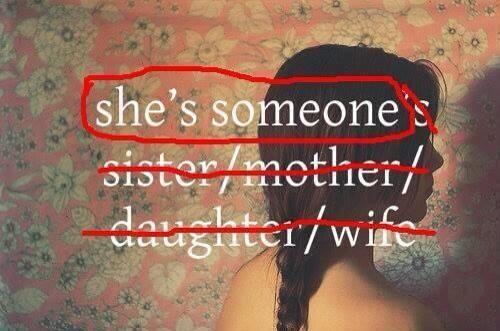
This weekend, there were two hashtags that caught my eye on Twitter: #sexismturnedaround and #YesAllWomen. The former started as a discussion about women pastors, but soon got much wider, and the latter began as a response to the awful Santa Barbara shootings.
Both were important discussions- I'd strongly recommend checking them out on Twitter, and I'm sure there'll be more of both in coming days. It's powerful to see a community come together around a shared topic or interest, especially ones as close to my heart as these - but they also reminded me of something I've been realising over the past few months.
Since I began writing and talking more about feminism and discrimination, women – both friends, and new acquaintances – have been sharing their stories on similar topics with me. And it's made me realise that, sadly, I'm lucky to be able to be writing about my experiences, and talking about them openly; with all of the experiences I've written about thus far, I've been able to get out of situations where I've been faced with bigotry or discrimination within a few hours, or at most a couple of days. I've always felt like I'm in a safe space (both online and offline) by the time I'm writing about these experiences. This is not the case for so many women out there.
Women who I've spoken to are faced with sexism as part of their everyday professional lives; some are living with the threat (or reality) of domestic violence or abusive partners, but who are too scared to leave; and almost all of them know that if they call out or even mention the abuse they are facing, it will almost certainly lead to even more difficulties for themselves, without any such certainty that their abusers will face any kind of consequences. With odds like that, it's not hard to understand why they choose to stay quiet.
It's been truly eye-opening for me to realise how many people around me are faced with those kinds of situations, and I have no doubt it would shock most other people out there too. Men around me have commented on how they're surprised that I face discrimination so often, and while I take that primarily as a compliment that they're really paying attention to what I'm saying or writing, and I appreciate hugely the discussions that have come out as a result, I'd also like to explicitly point out that my experiences are a minuscule drop in the pond compared to what women around all of us are facing every day. This might sound obvious, but I think it's worth saying: the fact they're not talking about it doesn't mean it's not happening.
I truly love the fact that writing has opened up these conversations with women and men around me, and I've learned an incredible amount from them (and, I hope I will continue to for a long time!). Writing, for me at least, is also a very cathartic act – it gives me a space to get things off my chest, to share experiences, and to think through ideas. Sometimes, it's been a way for me to say what I wanted to say at the time, but I couldn't – through fear, or shock, or a mixture of both. Knowing that other women out there don't even have this kind of outlet, is painful to me.
So back to Twitter; it's inevitable, then, that the women writing on these hashtags and sharing their views are just a tiny, tiny proportion of the people who are faced with discrimination and sexism. Obviously, it's only those of us who feel safe enough to write without the threat of repercussions who are participating.
I'd suggest that the large majority of women who are faced with abuse on a regular basis feel compelled to stay quiet because of the unsafe space they are in. However depressing or shocking the online discussions might get- bear in mind that they're just a tiny glimpse into the wider societal problems being addressed.
I recently came across Alice Bell's rather wonderful piece, “How to tell a white person they are being racist.” Despite being written, as she states clearly, “by a white person, largely aimed at white people”, I found a lot of the points mentioned very pertinent. But in practice (for me at least) calling out racism and prejudice in general is pretty tricky, and as I realised recently, one main reason is that I'm very rarely 100% certain what particular prejudice the person is displaying at the time.
Admittedly, some displays of bigotry are pretty simple to diagnose; the employee at an airport who helpfully directed me away from the EU/UK citizen queue towards the queue for foreign nationals, for example – bingo, racial profiling.
But, say, the lawyer who upon meeting me, put a 20 euro note in my hand instead of shaking it and told me to get him a coffee and an avocado sandwich “pronto”; what was it about me that made him think it was okay to do that? Was it my gender, skin colour, age, perceived inexperience, or did I happen to evoke some other type of prejudice in him?
Because if I take the decision to call out behaviour like that when it happens to me, the main trait I don't want to display is insecurity; I want to be entirely sure that what I'm saying is correct, and I want to say it with the most confidence and self-assurance I can conjure up. That alone can be difficult; so as you can imagine, a response along the lines of:
“No, I won't get you a sandwich; your behaviour is completely unsuitable, and you're being racist...or, sexist. Or maybe ageist? You're being prejudiced, in some way...”
doesn't quite have the desired kick to it. So, I don't say anything.
Being able to name exactly what it is that I find offensive about the behaviour in question also feels like it helps my case; it makes it harder to deny or to dodge, and as I've mentioned before, for me, putting a label on a type of behaviour makes it somewhat easier to discuss. Perhaps naively, I also imagine that being more specific also helps the culprit to identify the precise point within their thinking process that led to that incorrect and ignorant assumption being made.
For me, being able to suggest a concrete way that they can prevent repeats of this behaviour in the future lends a direction to the conversation, or at least my intervention: “Don't judge people by their skin colour” for example. It's a a concrete takeaway, and it's something that, ideally, they can remember upon meeting people of colour in the future.
But “don't be prejudiced”...? What good can come out of such a general accusation, apart from a similarly general denial? And, as it's normally coming at a time when I'm struggling to be taken seriously by them, I really, really want to sound as eloquent as I possibly can be in order to debunk their assumption.
And, worst of it all, within all this comes the conscious annoyance at myself that I'm even worrying about this; as Bell points out in her article, the responsibility of calling out prejudice shouldn't ever lie upon the marginalised group in question, and as she quotes battymamzelle:
“it's incredibly inappropriate to demand that a marginalized group restructure a conversation to make things more “comfortable”; for the very people they are mobilizing against. That is the very definition of flexing one's privilege.”
And yet here I am, worrying far more than I should, about how exactly that conversation could or should or might go. So maybe I should just simply call it out irrespective of my being able to identify what exactly the prejudice being displayed actually is (actually, it might even be a mixture of multiple prejudices- lucky me!) – and just say how unsuitable and offensive I find their behaviour, and walk away. And leave them to deal with how to interpret that information, and what to do about it.
Quite simply; it’s not my problem.
But you, dear reader; it very well could be yours. Sure, the victim identifying and calling out prejudice is a good first step; but those next steps of helping the culprit through working out how and why they have that prejudice, and what to do about it, is definitely not the victim's problem.
This is where Bell's article of advice to white people on how to tell a white person they are being racist (or prejudiced, or anything like that) comes into play. Simply being conscious and self-aware that you, yourself, are not committing those same ignorant acts is not enough – for this prejudice to stop happening, you need to play an active part in the solution.
The fact that you can ignore prejudice being displayed around you is a huge part of your privilege. Consider yourselves incredibly lucky that you can do so, and if you have any desire to use that privilege to help marginalised groups around you, step up and work with those groups to identify and educate prejudiced people around you.
Summary: I'm on the hunt for examples of feminism and gender equality from the majority world, AKA low-income countries. I'm collecting them in this custom timeline, and tagging the stories with #mwfem. Join me!
At the end of last year, I wrote about how, to my annoyance, most of the end of year 'feminist roundups' covered only achievements happening in the US, or in Europe. To counter this, I did my own round up of examples of feminism that happened in the 'majority world' in 2013- a term referring to what's also known as the developing world, or low-income countries, which also serves as a good reminder that the majority of people in the world live in these conditions.
While I was doing this research, I found it harder than I had thought to come across these events. This is an excuse often used by, for example, men organising conferences with a poor showing of women speakers - “I looked, but I couldn't find any!”; - and I hate that excuse. You're looking in the wrong places, or looking in the wrong way. So instead of searching for (clearly geographically focused) hashtags related to feminism campaigns that I had come across (#fem2, #twitterfeminism, for example) - I looked for activities related to gender equality, or 'strong women', or other ways of describing what I was looking for, and in different languages, too.
This was a lot more fruitful, but still, unsurprisingly, difficult. While the majority of the world is living in conditions of poverty, the majority of the internet is clearly not.
So, since the beginning of 2014, I've been keeping a 'custom Twitter timeline' of Majority World feminism: tweets that I've come across that relate to brilliant activities on gender equality in the majority world. I'm entirely sure that I've missed so many great activities (and all this in the certain knowledge that the majority of shows of strength and inspiration by women across the world don't make it on to the internet) but that said, there's some interesting stuff in there.
I've also made a conscious effort to try focus my online habits to material that is written by people who have different perspectives in life to me, from the majority world (ie. outside of the US + Europe). In practice, this has meant looking up international news stories in the local or national news outlets of the countries where this is happening to read (in theory) the perspective of someone who knows the culture and the country, and following people on Twitter who are based in other countries, living in different situations to me, with very different priorities and interests.
While, of course, this is nowhere near as good as being able to spend time, or visit, these countries, cultures and people, I'm learning a lot. It's one of my favourite things about Twitter; while it's a good way of keeping up to speed with topics I work on or I'm interested in, from experts in the field, it's also an incredible way of getting insights from people who have been left out of 'mainstream' media, or who are experiencing things that I don't come across in my everyday life.
Finding out what is important to people from a wide range of backgrounds is, for me, a great way of getting perspective on what's important to me, in literally real time. Curating the examples that I come across online of women doing amazing things under the most difficult of circumstances into this custom timeline is another way of getting that perspective.
It surprised me how much I've had to think about my habits in doing this, and how clearly geographically, and topically, focused I've been in my choices. I realised I had been focusing on material from institutions or outlets based in the UK, the US, or most likely somewhere in Europe; articles written by well-renowned experts or people with established online profiles; links tweeted by people I'd met, or whose work I'd come across (through one of the above sources, most likely), or people who had been recommended to me (eg. I'd seen online interactions between) - others I already knew. These methods were excluding so many perspectives from 'my' internet.
Now, I'm learning an incredible amount from people I've never met, about things I've never heard of, and coming across all sorts of interesting, and important, perspectives. I have a long way to go in changing my habits, (and suggestion of how to do this more are so welcome) and a whole lot more to learn, but it's been so much fun; thank you, internet!
(If there are topics or tweets you think I should add to the custom Majority World Feminism timeline, tweet me @zararah. Thank you!)
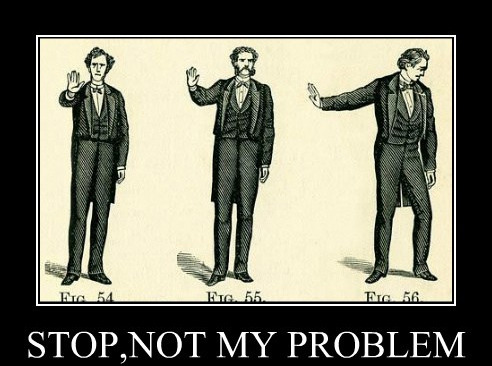
“I'm not racist but...”
began a conversation between myself and a German man last Sunday, while at an afternoon brunch party with a mixture of people I knew and people I didn't, all of them white.
He was of the opinion that people of colour couldn't be “British” or “English”, and that this was an title reserved only for white people. I was of the opinion that he was being bigoted and racist, and I proceeded to tell him so, getting more and more worked up as he revealed increasingly racist views.
After 10 minutes of our 'discussion', during which I had asked him to define racism, used this to explain why his views were racist, and realised that he actually genuinely thought of me as having fewer rights than himself and his white friends based purely on my skin colour, nobody else at the party had joined our conversation.
The funny thing was, though, that I know that a lot of the people at that party would consider themselves politically engaged, liberal and open minded people. I would even wager that if there were a politician voicing the same views as the man at the party, or a policy about to be passed along the lines of what he was saying, they would do what they could to stand up against this prejudice, be that by signing a petition, voting, or attending a protest.
But in this case – when the social pressures of being at a party were apparently first and foremost at play – they were simply embarrassed at the perceived tense attitude that had been created, and unwilling to challenge him. They were feeling uncomfortable at the situation, and tried to steer the conversation into less polemic ground.
When I left the party soon after with a couple of friends, I discovered that they too had been shocked by the opinions voiced. The difference was, though, that they felt like it hadn't been their place to say anything, that they didn't want to make the other guests or the host feel uncomfortable, and that they didn't really know what to say. This lack of willingness to challenge something they knew to be wrong shocked and hurt me.
I sometimes use the metaphor that someone being overtly and offensively racist to me feels a bit like I've experienced physical violence; when someone treats me like a lesser human being than my white counterparts, it really does feel like being punched in the face. I'm shaking afterwards, often almost unable to speak, and feel overwhelmingly exhausted.
What I tried to explain to them is: you shouldn't have to be the one being punched in the face to do something about it.
They, as white people living in Germany, had never been on the wrong side of racism, and consequently had never experienced that biting, intensely personal rage that I feel when someone treats me, or other people of colour, in a discriminatory way. As far as I'm concerned, never having experienced it personally makes no difference to whether you can challenge discrimination or not; consider yourself incredibly lucky that you haven't been put in that position, and use your voice to stand up for those who are, at every occasion that you can. As a woman of colour, it is not my responsibility to shoulder the burden of challenging sexism and racism and xenophobia and god knows what other kinds of discrimination I might face, on my own.
Prejudice manifests itself in all sorts of ways, through offensive policies affecting the lives of millions, through exclusion or discrimination on an institutional level, and, in this case, through one man, voicing his bigoted views at a party. All of these examples are dangerous and discriminatory, and all of these people need to be held to account.
Just because you happen to be a white person, or cis-gender, or a man, or any kind of arbitrary categorisation that bafflingly means you might not face a certain type of prejudice yourself does not mean you can switch your 'good citizen' or 'social responsibility' buttons on and off dependent upon the social situation you find yourself in. I've faced prejudice in all kinds of situations and, believe it or not, the environment in which it happens doesn't make it hurt any less.
I don't get to choose where I come across these offensive and bigoted people; why should you get to choose where you challenge it?
Over the past couple of years I've heard and read numerous media items about the internet and its effect on linking our previously disconnected societies, on networks and their effect on our relationships, and on cyberpolitics and culture. Sadly, many of them have left me incredibly frustrated, and here's why.
I've noticed what I think might be a pattern and here is my (obviously, generalised) hypothesis: when the speaker or author is from the US or Europe, they present information as though what they're saying is applicable throughout the whole world, while actually only talking about the issue with regards to 'Western' countries. They use examples primarily from the US or Europe itself, occasionally mentioning massive events in passing like the Arab Spring, but overwhelmingly considering only points that have affected people in high-income countries such as their own.
This has been annoying me greatly in other spheres too; as I've written about before, using public platforms to discuss issues under such a narrow lens, while presenting them as though they are they are true everywhere in the world is incredibly reductive and offensive, not to mention purely factually incorrect on many levels. It was frustrating me so much that at the last talk I attended where I noticed this phenomenon, I asked the speakers whether they truly considered the issues they were discussing to be 'global' as they kept mentioning, and if so, if they could come up with some examples from outside the US and Europe, as they had all been thus far in the presentation.
Their answer: that they did consider it to be as global as they were describing, but then couldn't come up with any examples. One said it was in part due to not wanting to misappropriate others experiences, but then admitted that she didn't have experience in other cultures outside the US and Europe. This combination of answers felt unsatisfactory, to say the least. I felt like asking – but didn't – then, why use phrases like “across the world” or “globally” etc, when what you really mean is “In high-income countries like the US....”. Either way, I hope my comments made them think, if even just a little.
But then, came a book which has, happily, has restored a lot of my faith in privileged researchers and internet commentators, and makes me throw that hypothesis out of the window – “Now I know who my comrades are”, by Emily Parker. The book, which is subtitled Voices from the Internet Underground, takes a deep dive into online and offline politics and activism in three very different countries; Cuba, China and Russia. I came across it originally through an article by Mario Vargas Llosa ([en], [es]) which was already high praise, as he is one of my favourite authors.
In the book, Parker looks at how the internet has helped activists in the three different countries organise themselves and build movements, despite facing huge offline political barriers, with some only becoming activists almost by coincidence due to their online activities. What impressed me the most about the book is the author's clear and extensive experience with the three cultures in question. She didn't just parachute in there for a couple of months each to write a chapter on some activists – she lived in each of the countries (some, multiple times over), speaks the languages and really built up relationships with people there, over a period of multiple years. It's also impossible to imagine how she could have carried out such research without being caught out by the authorities without a deep understanding of how each of the cultures work.
This is, I feel, what has been missing in the work by many other internet commentators: a genuine understanding of the offline culture in the countries they're talking about, and an appreciation for how the offline society and politics affects the way people use the internet. Even on a practical level, Parker talks of “the Russian internet”, or “the Chinese internet”, making it clear that these “internets” are very different to those in other countries. Primarily, of course, due to censorship – but also in terms of most popular sites, ways that people share information, and ways that they access the internet.
I really wish that other prominent internet commentators would make the time and effort that Emily Parker has done to actually visit and learn about other cultures before making sweeping statements; yes, the internet can connect us across offline borders, but in order to really understand online behaviour, it is crucial to recognise the importance of diverse cultures and societies on people's behaviour.
The overwhelming message from the book is that the internet has allowed previously separate or disconnected people to know that there are others out there – to find out who their comrades are. The actions that people have taken as next steps (both online and offline), however, has been vastly different depending on their cultural background and their political situation. I thoroughly appreciated Parker's emphasis on the contrasts between the activists' online actions; finally, proof, research and a well-written book to back up my frustrations of 'the internet' being overwhelmingly talked about as a holistic, homogenous entity!
* If there are other books out there really analysing how diverse societies and cultures have affected online behaviour, I'd love to have recommendations of what to read next!
The worst kind of creep is he who thinks of himself as a Good Man.
He who has dedicated his life to making the world a better place, but not in a self-righteous way; merely in a pragmatic, no-regrets, taking moral responsibility kind of way.
He who is highly renowned within his field, who has done brilliant work, and had some innovative and great ideas, which have had a positive effect on the lives of many.
He who has built up a professional and personal reputation as being tolerant and respectful of others.
He who has long-established relationships with other key members of the community; supportive, positive relationships, where he's proven his loyalty on numerous occasions, and always been there for them.
He who comes across, upon first, second or third meetings, as a fascinating man, with lots of valuable experience and a willingness to share this with others, for mutual benefit.
He who listens and sympathises with others relating tales of discrimination, harassment, or creepy people.
He who, if cases of his creepy tendencies were to come out, would plead misunderstanding, and publicly apologise profusely, all while remaining convinced that his actions were misinterpreted through zero fault of his own.
He who genuinely can't fathom the idea of himself being a creep.
He who does it again, and again, and again.
I've been talking about 'mansplaining' a lot this week; first, to some female friends who hadn't previously heard the term but immediately understood the concept, and then a few days later, to explain to other friends why I particularly disliked certain people at an event I was at; they had spent the afternoon 'mansplaining' at me.
For those who might not have come across the term, it's a mix between 'man' and 'explaining', used to describe the “act of a man speaking to a woman with the assumption that she knows less than he does about the topic being discussed”, purely because she is a woman. I have every faith that women reading this will know exactly what that means, and most likely men reading this will have either been in the presence of mansplaining, or (hopefully not) have mansplained themselves.
My friends who hadn't heard of it before found it a funny term, and sadly we all had stories of being mansplained to. We laughed a lot while trading stories; many of them were hilarious, if only in the tragi-comic sense. For me, being able to put a label on a thing, in this case a social act, often makes it a lot easier to discuss, because you realise that other people share that experience. It's for this reason that I was particularly happy to come across the term 'flirty racism' – finally, a label for one of my most hated things, and with that, the knowledge that other people had experienced it too.
I had thought that being conscious of the label “mansplaining” would also make it a lot easier to recognise when it was actually occurring. It turns out that I was wrong – yesterday, while I was at an event, I had the misfortune of being mansplained to for hours and hours, and it took me about half of those hours to even realise what was happening.
And when I did, I just didn't know what to do. I re-explained gently (probably too gently) that there was no need for the condescending explanations being fired at me, and yet they kept coming. Ideas I came up with were shot down, suggestions for how to get round all the blockers that they brought up were flat out refused, and it made the whole conversation incredibly difficult. Being in a group situation also made it more difficult to be direct, and (this is my own fault entirely) I was too taken aback by the whole thing to call it out in front of the group, for fear of making things even more awkward than they already were.
Long story short; I left the conversation and the group, and ranted to friends at the same event about how annoying the situation had been. But while doing that, I didn't know what I was hoping to achieve either; they didn't find the men in question as terrible as I did as obviously they had never personally had that experience, but they were sympathetic to my rants. I didn't confront the men in question myself because I didn't want to create a scene, and I ended up incredibly frustrated at how I'd been talked down to – or rather, how I'd let myself be talked to like that for much longer than necessary.
And today, I'm left wondering – what would have been the best response in that kind of situation? Taking them aside privately and asking them to reconsider their attitude? Calling it out in front of the group, to save having to repeat the exercise separately? Announcing some basic 'social courtesy' guidelines in front of the group, repeated regularly depending on whether they had internalised what I was saying? (And yes, a small part of me was thinking – should I just punch them in the face, and be done with it? See number 5 in this list)
It was clear that they respected much more anything being said by men, but I definitely didn't want to resort to asking male friends to have a word with them on my behalf. I also wasn't entirely sure what was happening until someone else highlighted it to me – I genuinely thought I was just communicating unusually badly, and this reaction annoys me greatly.
I've actually no idea what the answer is to this question – how does one actually deal with mansplaining, in the most socially acceptable, least awkward, and “best” way?
Answers on a postcard. Or to @zararah.
PS. for male readers who might be worrying if they're mansplaining, here are some tips to make sure you don't become that guy.
Over the past couple of months, I've had the privilege of travelling to Bangladesh, Canada, Spain and Switzerland, and oddly, I found that all four had an unexpected quality in common; the way in which different languages within the country influenced and affected everyday life and politics.
In bilingual Montreal, anything that was government-run (including a couple of days of the conference that I attended) had to be conducted in both French and English. Wonderfully, this meant government officials would switch languages halfway through speeches and sometimes even halfway through sentences. In between feeling sorry for the interpreters, I thoroughly enjoyed this blend of languages.
It became clear also, that there were many more loan words between their particular versions of English and French, because of the switching; hearing people talk (in English) about the 'animator' of a particular company left me a little confused before realising that 'animateur' in French simply means “organiser” - they were talking about the head of the company, not a designer! Similarly, I'd never heard 'bienvenue' (literally, 'welcome' but in France, always used in the context of 'welcome to... (a place)' rather than 'you're welcome) as a response to 'merci'.
I heard also of resentment growing towards English speakers in increasingly Anglophile areas of Montreal, where staunch Francophiles would respond to anyone in French, even if they understood and spoke English, and knew that the speaker wouldn't understand them.
I experienced a similar phenomenon myself in Spain, when I stopped by Barcelona a week later; in cafes, although I was speaking 'castellano' (ie. Spanish understood in Spain) people would only respond to me in Catalan, despite me having made clear that I didn't understand Catalan.
It was the first time I'd experienced something like this personally. For example, in a cafe I apologised for not speaking Catalan and asked for a bottle of water in Castillian; the waiter went to fetch the water but continued speaking Catalan to me, I apologised again, and instead of simply saying how much I owed in a language I understood, he wrote down the figure on a pad of paper and pushed it towards me. He was very, very determined not to speak anything but Catalan!
When I got to my final destination in Spain, Zaragoza (just next door to Catalunya) I was asked a lot about the upcoming referendum on Scottish independence. People seemed to see lots of comparisons between Catalunya and Scotland, and some were slightly incredulous that the UK had 'allowed' Scotland to hold such a referendum. It was clear that the reluctance of people I met in Barcelona to speak anything but Catalan was part of a much wider battle, one which came up much more frequently in conversation than it had when I was living in Madrid back in 2009.
Politics and language, in this case, were clearly linked, and this was another theme I saw while I was in Switzerland, as, sadly, a vote was passed to impose quotas on immigrants to the country. There were two clear trends in voting for this xenophobic law; firstly, the language split, and secondly the number of immigrants in those areas.
This is a map of the language split in Switzerland; as you can see, the Swiss German population is the largest (63.7% of the population) followed by Swiss French (20.4%), then Italian (6.5%) and Romansh (0.5%).
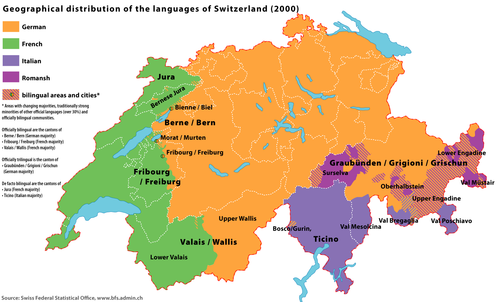
And this is a map of how people voted in the elections; there's a heavy overlap with the Swiss-German areas, and the areas that voted 'Yes', with the exception of Zurich, up in the north.
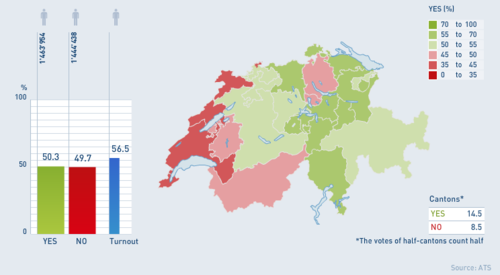
[image via @electionista]
Another trend, illustrated by the chart below, shows that regions with fewer immigrants were more likely to vote 'yes' (ie. for the introduction of quotas) whereas those with high percentages of immigrants already living in the regions tended to vote against the quotas. Fear of the unknown was clearly a motivation for those who hadn't experienced much immigration in their areas, and seemingly didn't want to, either.
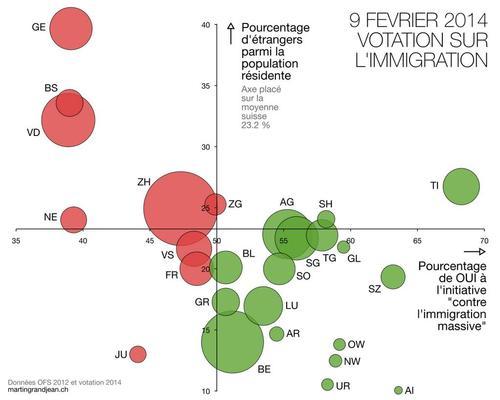
[image by Martin Grandjean]
I wasn't aware previously of the extent of the majority which the Swiss German population hold here; clearly, with over 60% of the population, they are the most powerful demographic. I also find it interesting how people tended to vote in blocks depending upon their language affiliation; again, clearly language is a lot more than merely a method of communication.
Another example of the crucial importance of language can be seen in Bangladesh, which is, as far as I know, the first country that was born out of a language-related dispute; essentially, the political movement fighting for the right to use Bengali as an official language in everyday life was a catalyst in the move towards national identity, which were precursors to the Bangladeshi Liberation War.
Having seen so clearly in just those four countries the power and importance of languages within society, seeing statements coming out of the UK encouraging people to study languages for economic reasons, or in David Cameron's words "to seal tomorrow's business deals” frustrates me hugely. I find encouraging language learning by way of promoting trade between countries a terribly sad, and reductive, perspective on the many riches that different languages bring to society.
There are many, many other reasons that us lazy native English speakers should learn other languages; understanding cultures, societies and people being just some of them. If we in native-English speaking countries want to have any chance of understanding the politics, societies and cultures of other, language-diverse countries, we have to stop thinking about language-learning as a luxury or as an economic tool, but instead realise that it's a crucial step towards tolerance and understanding of other cultures.
Dear white feminist public figures,
I'm writing to ask, quite simply, that you remember and recognise that the feminist movement is a global movement. It doesn't sound like much, does it? In my mind, it's not, but all too often I see and hear things that point to the contrary – hence this blog post.
I know that in some cases you worry about (mis)appropriation; that by mentioning experiences from other cultures, you'll face indignation from people of that culture, saying that you're not in a place to be talking or writing about them. But there's ways of mentioning things that make it clear that you're not trying to appropriate the experiences of others, merely paying homage to them.
Let me demonstrate.
“As feminists in [insert country] have demonstrated, [their experiences]. To find out more about this, I'd recommend you look up [their names].
Or how about:
“I've been inspired by hearing about the work of [insert name here] in [insert country]. I'm in no place to discuss what they've been through, but hearing it directly from them can be powerful. I'd recommend you take some time to read the work of [insert their names].
Maybe I'm wrong, but I'd like to think that proper accreditation and recognition of who's been doing the work might stave off the appropriation claims.
Doing this serves some major purposes; it means that you are using your voice and your platform to recognise the work of others, who might not have access to such similar platforms. It makes others who might not come across their work, aware of what they're doing. It raises their profile, and makes it easier for them to gain a place on a global stage; a place which, (though of course, through no fault of your own!) you have had privileged access to.
If you haven't heard of any examples from other parts of the world, or you genuinely don't have any material to add to your writing/talking from outside of your own country or continent, then please make this clear in your writing.
I'm sorry for picking on this one example, especially when (sadly) there's many more out there – but writing headlines like “23 Awesome Feminist Digital Campaigns That Changed the World” when 22 out of the 23 examples originate from the US, the UK and Canada, is, to my mind, incredibly reductive, and actually slightly offensive. Given mainstream prejudices already prevalent in those countries, your article is only strengthening the popular (but obviously, invalid) view that feminism is a 'western' ideology, not found in the rest of the world. (otherwise, surely, those examples would be included in an article about campaigns that 'changed the world', wouldn't they?)
If you want to keep the same content of the article, then how about a more accurate title – instead of 'changed the world', you could say, 'changed the western world'. Or, why not take this opportunity (and your position as a well-read and well-respected writer) to direct some attention towards other areas of the world that are less covered in the media? Or towards people who, perhaps because of lack of privilege, or discrimination, haven't enjoyed access to such widespread media platforms as yourself?
And, if you really haven't been exposed to any other cultures, then, at the risk of sounding patronising, just spend some more time on the internet. The internet is wide and connected and, global. Yes, they might take some more time to find, but there are stories and voices from all parts of the world on the internet, and they deserve to be heard. Google translate is your friend! And remember in some languages, feminism might be better known as, for example, “gender equality”; or talked about as “women's rights.”;
If you're in a position where you are able to, then why not travel? It's still valid to read about other peoples' experiences, but it'll give you a whole new dimension to actually meet them, see what they're talking about, and hear about them in person.
You are in a position where people listen to you; this is due to your hard work, talent, and, in all honesty, an array of features that you happened upon by pure chance – your skin colour, perhaps the place you were born, any number of arbitrary features. You have a responsibility to use your platform to make feminism recognised as what it really is; global, wonderful, inclusive and diverse.
My ask; please make the most of your public platform to point some attention towards some incredible campaigns, people and ideas who are unfairly ignored in the media. You're not by any means the problem behind this injustice, but you can definitely be part of the solution.
Thank you.
I've been coming across articles highlighting 2013's greatest feminist moments - this 28 Most Iconic Feminist moments of 2013 for example, or the 25 best moments for women in 2013 - and while they have some brilliant moments included, I couldn't help but notice that they're very US-centric [1]. Surely the majority of 2013 feminist wins didn't happen in the US alone?
Well, no - feminism is alive and kicking in the rest of the world too, and here's ten examples highlighting just how.
A self-declared feminist and women's rights activist became Prime Minister of Senegal
In September, Aminata Touré became Prime Minister of Senegal. True to her unique style, she even announced her new appointment herself. Former Justice Minister, she's known for her strong anti-corruption stance, and has had an impressive career as a human rights activist. And let's not forget; Malawi and Liberia also have female heads of state - Joyce Banda and Ellen Johnson Sirleaf, respectively.
Chimamanda Ngoza Adichie's TedX Talk “We should all be feminists”;
Being sampled in Beyoncé's track “Flawless”; probably did wonders for Adichie's popularity among a whole new audience - it's well deserved, though. A related feminist win - her latest book, Americanah, came out earlier this year. Highly, highly recommended.
In Rwanda, women won 64% of seats in Parliament.
Rwanda beat their own record of percentage of women in parliament – jumping from 56.3% to a massive 64 per cent of women earlier this year.
Women now occupy 51 out of the 80 seats in the Lower House, thus retaining the title of being the only country in the world with a female dominated parliament- a title they first earned in 2008, when women held 56% of seats. There's a quota in place to ensure female representation, but it's only for 30% of seats. More on Rwanda's gender-friendly policies here
Mayam Mahmoud, Egypt's first hijab-wearing rapper
Aged 18, Mayam Mahmoud got through to the semi finals of Arabs got talent; she encouraged people to look past her veil, and listen to what she's rapping about.
The release of the first feature film directed by a Saudi Arabian woman *
Written and directed by Haifaa Al-Mansour, Wadjda (Arabic: وجدة,) was filmed in the streets of Riyadh, meaning that the director had to work from the back of a van to avoid publicly mixing with men working on her crew. The film- the first feature film to be shot entirely in Saudi Arabia, was also the country's first official submission to the Oscars for the Best Foreign Language Film. Listen to Haifaa Al-Mansour talk about the challenges she faced, and changes happening in Saudi Arabia here.
Women were finally invited to take part in Colombian government negotiations with FARC
After huge efforts by Colombian women's groups working to highlight the key role of women in peacebuilding, Colombian President Juan Manuel Santos finally announced that women would be invited to join the negotiation team. María Paulina Riveros y Nigeria Rentería Lozano, both lawyers, joined the previously all-male team at the end of November 2013.
A record number of women presidents in Latin America; 4 women heads of state
Despite being a continent known for “machismo”, there are now women leading Argentina (Cristina Fernández de Kirchner), Brazil (Dilma Rousseff), Costa Rica (Laura Chinchilla), and most recently Chile, following Michelle Bachelet's overwhelming win with 62% of the vote earlier this month. No implied endorsement of any of their policies, though!
Satirical video “No Woman No Drive”; went viral *
This video, mocking Saudi Arabia's ban on letting women drive, hit 10 million views earlier in the year. Here's hoping some of the princes saw it too.
Women's empowerment recognised as a major reason behind Bangladesh's health successes
Medical journal The Lancet released a series of papers looking at healthcare in Bangladesh, saying
“Improvements in the survival of infants and children under 5 years of age, life expectancy, immunisation coverage, and tuberculosis control in Bangladesh are part of a remarkable success story for health [in Bangladesh].
...Perhaps the most powerful strategy for health was the country's distinct acknowledgment and support of women to national development.”;
Yemen's human rights minister called for a ban on child marriage
In September, Huriya Mashhoor, the Minister for Human Rights in Yemen, called for the revival of a bill which would set the legal minimum age for marriage to 18 years old. Her decision came after international condemnation following reports that an 8 year old died of internal bleeding on the night she married a 40 year old man.
Though no further progress has been reported, in November this year, Yemeni police stopped the wedding of a nine year old girl; it was reportedly the first such intervention to stop a child marriage in Yemen.
1 Suggestion: consider adding “from the US”; on to the end of both of those headlines, to avoid over-reduction of the global feminist movement.
* Not strictly 'majority world' countries - but ones where improvements in women's rights are thoroughly needed, so I've included them here.
Wherever possible, I've tried to use local media sources in the links here- if there are any that could be replaced, let me know! I know I've missed lots out lots of other great moments, too - any to add, ping me @zararah or drop me a line zararah[at]gmail.com
This article, on Posh white blokes in NGOs, caught my eye a couple of weeks ago. And then this reply, by an employee of an author of the first.
Rather than hashing over the whole discussion again, it's enough to say that I enjoyed a number of things about these pieces; that Ben Phillips was self-aware enough to write the piece, that Guppi Bola was pragmatic enough to, rather than simply talking over the issue, suggest some clear and concrete actions that NGOs and organisations can take.
I also enjoyed the fact that none of these suggestions involved gender stereotypes; no organic juices for the women, no football sessions for the men, but instead genuinely fair and balanced suggestions to help organisations be more diverse and “make change happen for real.”
This is not what I see in many other initiatives also claiming to make change happen; and here, I have specific examples to mention. Women in technology initiatives which, while with the best of intentions, miss the point entirely.
I've talked about women in tech initiatives with a number of friends and colleagues over the past few weeks, and it's been great to get people's feedback on some issues I've been feeling uncomfortable about. Here's why.
a. I want to be recognised or singled out on a merit-only basis, most definitely not because of my gender. I don't want to be offered special courses or have doors opened to me, purely because I am a woman.
b. The women in tech initiatives that tout the benefits of learning how to code as though its the silver bullet for everyone. An example of an article that does this is “I wasted four years of my life – don't make the same mistake” by Belinda Parmar, founder of Lady Geek. In short: studying anything but a STEM career, was a complete waste of time. Humanities didn't teach her anything.
“The next three or four years of your life may be romantic, inspiring and entertaining, but you are still wasting your time.”
Apparently, being inspired is a “literal” waste of time - slightly ironic then, that the blog was run in the series ‘Inspiring leaders’.
Learning how to code, or having a career in technology, is not for everyone, and this article, “No you don't need to learn to code” explains why, brilliantly.
c. In some ways, all-women initiatives reinforce gender stereotypes entirely. I once came across a list of things required to run a successful women-friendly hackathon, which included having a craft corner, providing organic juices, and running yoga classes.
The depth of gender-related assumptions and stereotypes within those suggestions; the fact that this was coming from someone within an organisation advising others on how to run women-friendly events; the assumption, above all, that all you need to keep women happy in tech is crafts, organic juice and yoga?! Please, give us some credit. Paraphrased from a colleague – what about good wifi and coffee?
But then, there are of course strong arguments to the contrary; women in tech initiatives have, for everything I've said here, done some great things. They've created safe spaces for women who might otherwise have not followed their desire to learn to code, or to start a career in tech, and they are inspiring girls to take up STEM subjects, with strong role models to follow.
It's no mean feat, and I don't mean in any way to undermine these achievements with my comments above; I just can't help but feel a little strange, sitting in a room full of only women, with computers in front of us. But a friend of mine expressed this situation very well recently:
“Perhaps the only way we can bring the balance to the middle is by skewing it really far the other way.”
It's a fair point – maybe, in order to balance out the years of male-dominated technology initiatives, we need to grow and support these all women initiatives, in the hope that one day the two of them balance out.
In the meantime, though, I do wish that all-women technology initiatives would take the time to think about how they are going about what they do, making sure that they're not reinforcing the gender stereotypes they've been working so hard against, and not losing that sense of self-awareness that is all too crucial to discussions about diversity.
And there you have a sentence that, incredulously, I keep hearing from my peers. At first, I was outraged; mostly, the people saying things like this are women, in their mid-twenties, young professionals working their way up the career ladder, over-achievers, well-educated, independent women.
What do they mean, they're “not feminists” - of course they are! If I asked them who was more intelligent between them and a male colleague, they wouldn't automatically default to the man. They're competitive and ambitious people; there's no crisis of confidence going on there, they know that they're just as capable as the men they work with.
But somehow, they don't consider themselves to be feminists. Perhaps, yes, the word feminism has been hijacked in popular culture to mean something other than 'people who believe in gender equality' – but the thing that shocked me most was that actually, they know that, and when they say they're not feminists, they mean it.
Yes, a woman can be just as intelligent as a man. But of course, believing simply that doesn't make you a feminist. The penny dropped for me while a friend was describing another friend's new boyfriend.
“He really looks after her, and he fixes everything around the house. It's just what she needs in a boyfriend.”
The next clue came soon after.
“My boyfriend would never let me do that!”
And then :
“Of course he doesn't do the cooking, he's the man!”
There were more. She, as an independent and well-educated woman, was and is perpetuating a bucket load of gender stereotypes that feminists all over the world have been focused on quashing. And sadly, she's not the only one. Somehow, these misconceptions have been so wired into some of my peers that they are firmly rooted in their cultural and social values.
And, strangely enough, it's apparently entirely possible to be against sexism (sometimes), without being a feminist. Selecting between when you're being discriminated against (sexism=bad) and when you, yourself, are perpetuating the gender stereotypes in a non-offensive way, seems like a funny distinction to make.
Feminism is apparently seen by many as a pipe dream, if that. An unwanted pipe dream might be a better way to describe it. The easy route (as seen by many) : all you've ever wanted is a husband and a house to clean, to have babies, to be looked after and provided for, and yet, for some reason, here these feminists kicking up a fuss when actually, that picture sounds perfect.
The fact that wanting to bow down to these patriarchal structures is seen as 'normal', while wanting to have the same opportunities in life as men is the odd option to choose, baffles me. It baffles me more that women who have truly benefited from the feminists of past generations fighting for that equality now seem so willing to forfeit those rights.
And how do you argue with someone who knows exactly what choices she is making and the consequences of what she is saying? She knows that perhaps more progressive ones amongst her friends will be shocked at her anti-feminist views, but she doesn't care. She's been exposed to all these views, and yet chooses to play the role of housewife. Do we simply accept these views and move on, hoping fervently that those misconceptions that she, as a woman, is 'supposed' to be in the kitchen, is 'supposed' to stay at home and pass up her career, won't get passed on much further?
Somehow, it feels incredibly ungrateful to all the great feminists who have fought for our equality (not to mention the fact that we're not even there yet in terms of equality). Responding to the opportunities that we've been given with resounding denial that we even needed any of them, just doesn't seem right.
